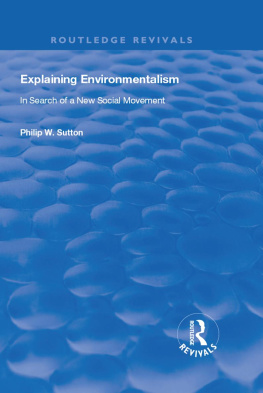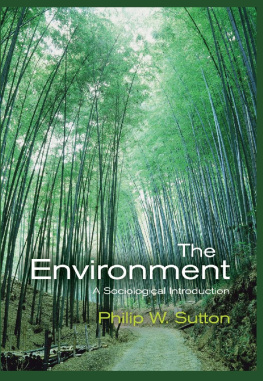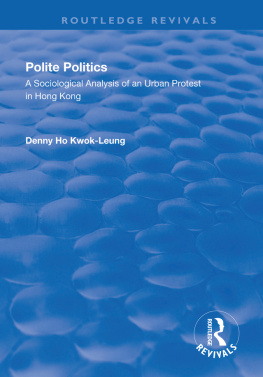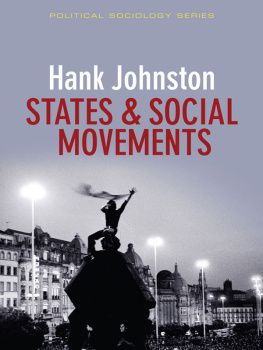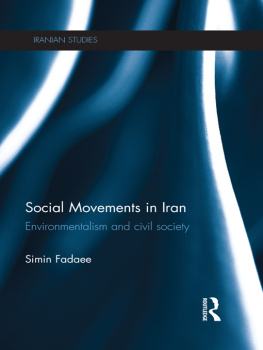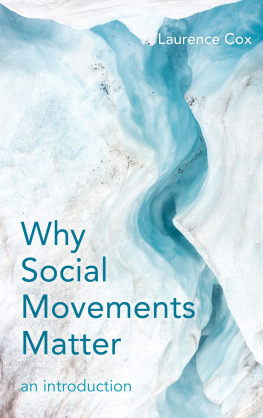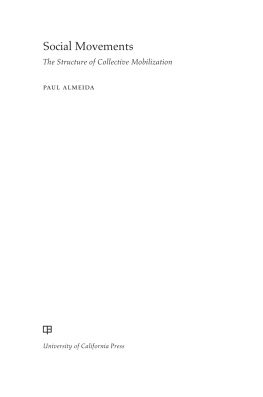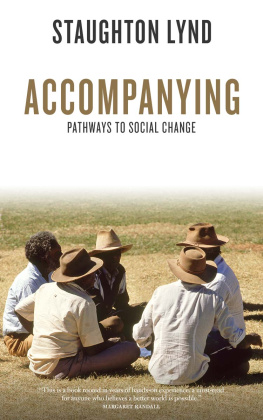EXPLAINING ENVIRONMENTALISM
For Patricia
Explaining Environmentalism
In search of a new social movement
PHILIP W. SUTTON
University of Leeds
First published 2000 by Ashgate Publishing
Reissued 2019 by Routledge
2 Park Square, Milton Park, Abingdon, Oxon, OX14 4RN
52 Vanderbilt Avenue, New York, NY 10017
Routledge is an imprint of the Taylor & Francis Group, an informa business
Philip W. Sutton 2000
All rights reserved. No part of this book may be reprinted or reproduced or utilised in any form or by any electronic, mechanical, or other means, now known or hereafter invented, including photocopying and recording, or in any information storage or retrieval system, without permission in writing from the publishers.
Notice:
Product or corporate names may be trademarks or registered trademarks, and are used only for identification and explanation without intent to infringe.
Publishers Note
The publisher has gone to great lengths to ensure the quality of this reprint but points out that some imperfections in the original copies may be apparent.
Disclaimer
The publisher has made every effort to trace copyright holders and welcomes correspondence from those they have been unable to contact.
A Library of Congress record exists under LC control number:
ISBN 13: 978-1-138-71840-1 (hbk)
ISBN 13: 978-1-315-19583-4 (ebk)
Contents
This book is a revised version of my doctoral dissertation and has benefited enormously from several disparate sources. I would like to thank my thoughtful colleagues and friends, particularly Stephen Vertigans and Steve Clarke for taking the time to read the entire manuscript at moments more crucial for the project than perhaps they realise, and for their constructive (and destructive!) comments which forced me to re-think some of the arguments. Ian Varcoe and Richard Kilminster were continuous sources of support, encouragement and sociological good sense over a number of years, and I have been fortunate to be able to discuss important theoretical issues with Chris Drinkwater and Conrad Russell. Paul Bagguley and Steven Yearley provided thoughtful and insightful critical comments on the thesis and I have tried to pay them heed.
Participation in Cultural Studies Workshops at the University of Leeds brought me into contact with different departments and specialisms and helped to convince me of the need for a sober sociological assessment of recent social change. I must also take this opportunity to express personal thanks to Judith Graves and Lynn Towell for their infectious enthusiasm during the books pre-history, and for which I am ever grateful.
Thanks to all the Editorial staff at Ashgate for their efficient work on bringing the book to completion which has undoubtedly improved the final version, and special thanks to Rosalind Ebdon for her keen-eyed checking of the whole manuscript. The anonymous reviewer at Ashgate also provided positive comments and very helpful suggestions for improving Chapter Three, and deserves to be mentioned. You know who you are! As usual, all the books failings are mine alone, though I cannot claim the credit for all of its virtues.
Finally, special thanks must go to Kevin and all of those who shared in the practical seminar on perseverance and self-belief in Barcelona on the evening of May 26th 1999, where we learned so much, and heartfelt thanks to Pat, without who this book simply would not have been possible.
In the literature on varieties of environmental or Green thought, a basic distinction exists between reformist and radical approaches to the defence of the natural world from human interference. Unfortunately there is no consensus on the use of terms in this literature, so that whilst some writers use environmentalism to describe a managerial reformist approach to the conservation of nature, others use the same term to refer to radical ecology or Green politics which rejects reformism, arguing for major transformations in the Western way of life.
The basic dichotomy goes back to Arne Naesss (1973) use of the distinction between shallow and deep ecology as philosophical approaches to society/nature relations, but since then a range of other terms have entered the discourse. Andrew Dobson (1990), uses green (reformist) and Green (capital G) (radical), Eckersley (1992) defines ecologism (radical) in contrast to several other forms such as conservationism (reformist), while Jonathon Porritt makes a distinction between light (reformist) and dark (radical) Greens (1984). What all the above writers are attempting to do is to show that the earlier ideas and practices of nature conservation, preservationism, and arguments for public access to natural areas only produced strictly limited analyses of the human/nature relationship, and do not call for urgent action and social change, whilst the newer Green, ecological perspective goes beyond these, to demonstrate that solving contemporary environmental problems will require a radical restructuring of the ways of life currently enjoyed in modern societies. It is this political message which seems to set ecologism apart from environmentalism.
Throughout this study I will characterise the basic distinction between reformist and radical approaches as that between environmentalism and radical ecology respectively, though for grammatical purposes I will sometimes refer to the latter as Green. Part of my argument is that the two approaches are distinct enough to justify the separation, but also because the historical development of reform environmentalism and radical ecology are substantially divergent. What Dobson calls ecologism and Eckersley calls ecocentrism do, I believe, ask questions of existing political ideologies and worldviews respectively, but these questions are not wholly new ones. The kinds of questions asked by radical ecology, and many of the answers offered have a familiar ring, but what seems to have changed is the context in which these questions are raised. First though, we must establish the terms of the discussion.
The term environmentalism is often used in Green circles, to describe an earlier form of nature concern which is now superseded by a deeper, ecocentric analysis of the relationship between human societies and the natural world. As I use the term in this study, environmentalism refers to those approaches to society/nature relations which emphasise the benefits to human beings of natural objects, and to attempts to rectify problems of environmental damage and pollution through technological means. For environmentalists, interest in and contact with the natural world are seen as part of an enlightened view of human well-being. Humans can benefit in several ways from this interest. Nature study offers pleasures of aesthetic or scientific kinds, leisure pursuits can help humans to lead healthier lives, society can benefit from the preservation of endangered species as this maintains genetic diversity and can be useful in developing new medical treatments (an argument often advanced in support of protecting tropical rainforests), and so on. This perspective is human-welfarist in so far as its main arguments rest on the value of nature conservation for society and where no benefit can be gained for human society, then environmentalist arguments against scientific and industrial development fail, particularly if that development brings other benefits such as employment opportunities, housing and increased convenience.

